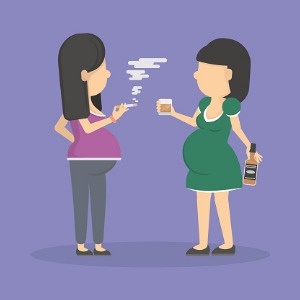
“Have a drink, it will relax you! Let’s have some champagne to celebrate your pregnancy. One drink won’t hurt.”
You’ve heard this sort of invitation and advice, and probably thought that the odd drink at special moments during your pregnancy won’t make a difference to your baby.
This might not be true...
Effects of alcohol on the unborn baby
Drinking any kind of alcohol during any stage of pregnancy has consequences, though these vary from mild to severe. Basically, the issue is that when the mother drinks, the baby drinks too.
Potential risks:
- Greater risk of miscarriage or premature delivery.
- The unborn baby’s body cells can get damaged which could lead to a lower birth weight, and one or more deformities.
- The brain cells of the developing baby can be damaged by alcohol and your baby can be born with mild to severe brain damage, a mental handicap or minimal brain dysfunction, like dyslexia, autism or hyperactivity.
In cases where the mother-to-be drinks heavily, especially during the first three months of pregnancy, the following severe damage occurs (a condition called "foetal alcohol syndrome"):
- Mental handicap or retardation.
- Heart defects.
- Low birth weight and size.
- Small head.
- Distinctive facial features, such as a flat upper lip, small eyes and chin, and low-set ears.
If you're pregnant and have six glasses of spirits a day, your baby is exposed to a 50 percent risk of being born with foetal alcohol syndrome. FAS is probably the most common single cause of mental handicap. But it's also the most preventable disorder. You can prevent damage by simply avoiding alcohol during the entire pregnancy.

When is your baby exposed to greatest risk?
Though there's risk throughout pregnancy, the first trimester is when the baby's brain, spinal cord, heart and liver start to develop. It's a time of active cell division and the cells are particularly sensitive to the effects of alcohol and other negative factors, including poor diet, medicines (prescribed and over-the-counter) and smoking.
Be very careful during these vital three months. Don’t drink alcohol, smoke or take medicines (not even a headache pill), and ensure that your diet is balanced. Alcohol can also have highly negative effects during the last two trimesters of pregnancy (from the third to the ninth month). During this period the unborn baby grows rapidly and alcohol can adversely affect its growth, causing low birth weight and retarded early development.
And what about the time before you fall pregnant? The best thing to do if you're planning to fall pregnant is to stop drinking immediately and abstain until well after the baby’s birth. This will give your baby the best possible chance to avoid damage caused by alcohol.




 Publications
Publications
 Partners
Partners















